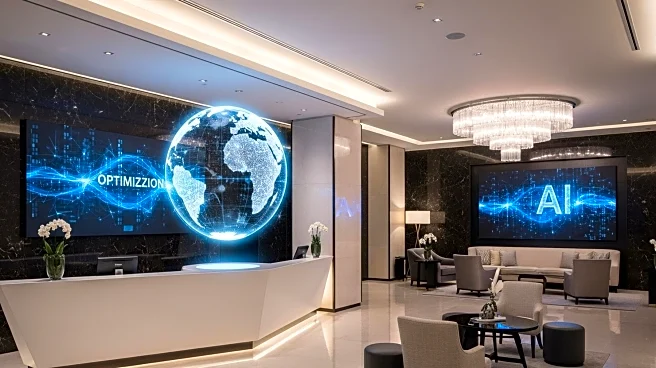What is the story about?
What's Happening?
The hospitality industry is experiencing a shift in how travelers discover and book hotels, driven by advancements in AI search technology. AI platforms like ChatGPT, Gemini, and Perplexity are increasingly being used to streamline the search process, providing users with a single trusted answer rather than a list of links. Hotel operators are encouraged to adapt their online content to optimize discoverability in AI search results. This involves implementing common-sense practices such as updating content regularly, structuring pages for machine readability, citing external sources early, and maintaining consistency with brand voice. These strategies are designed to ensure hotels remain visible and competitive in the evolving distribution landscape.
Why It's Important?
The integration of AI in the hotel booking process represents a significant change in the hospitality industry, impacting how hotels attract and retain customers. By optimizing for AI search, hotels can increase direct bookings and reduce reliance on third-party platforms, potentially lowering commission costs. This shift also highlights the importance of staying ahead of technological trends to maintain competitiveness. As AI continues to evolve, hotels that fail to adapt may find themselves at a disadvantage, losing visibility and market share to those who embrace these changes. The broader impact includes potential shifts in marketing strategies and customer engagement practices within the industry.
What's Next?
Hotels are advised to focus on optimizing their content for AI search engines, ensuring their presence in Google's hotel ecosystem, and maintaining coverage on major online travel agencies (OTAs). Additionally, hotel operators are encouraged to educate themselves on AI search optimization through courses and resources that provide practical examples and action items. As AI technology continues to develop, hotels will need to remain agile and responsive to changes in search algorithms and consumer behavior. The ongoing adaptation to AI-driven search processes will likely lead to further innovations in how hotels market themselves and interact with potential guests.
Beyond the Headlines
The rise of AI in hotel bookings may lead to ethical considerations regarding data privacy and the transparency of AI algorithms. As AI platforms become more involved in the booking process, questions about how data is collected, used, and protected will become increasingly relevant. Additionally, the reliance on AI for recommendations could influence consumer choice, potentially favoring certain hotels over others based on algorithmic biases. These developments may prompt discussions about the need for regulatory frameworks to ensure fair competition and protect consumer interests in the AI-driven hospitality market.















